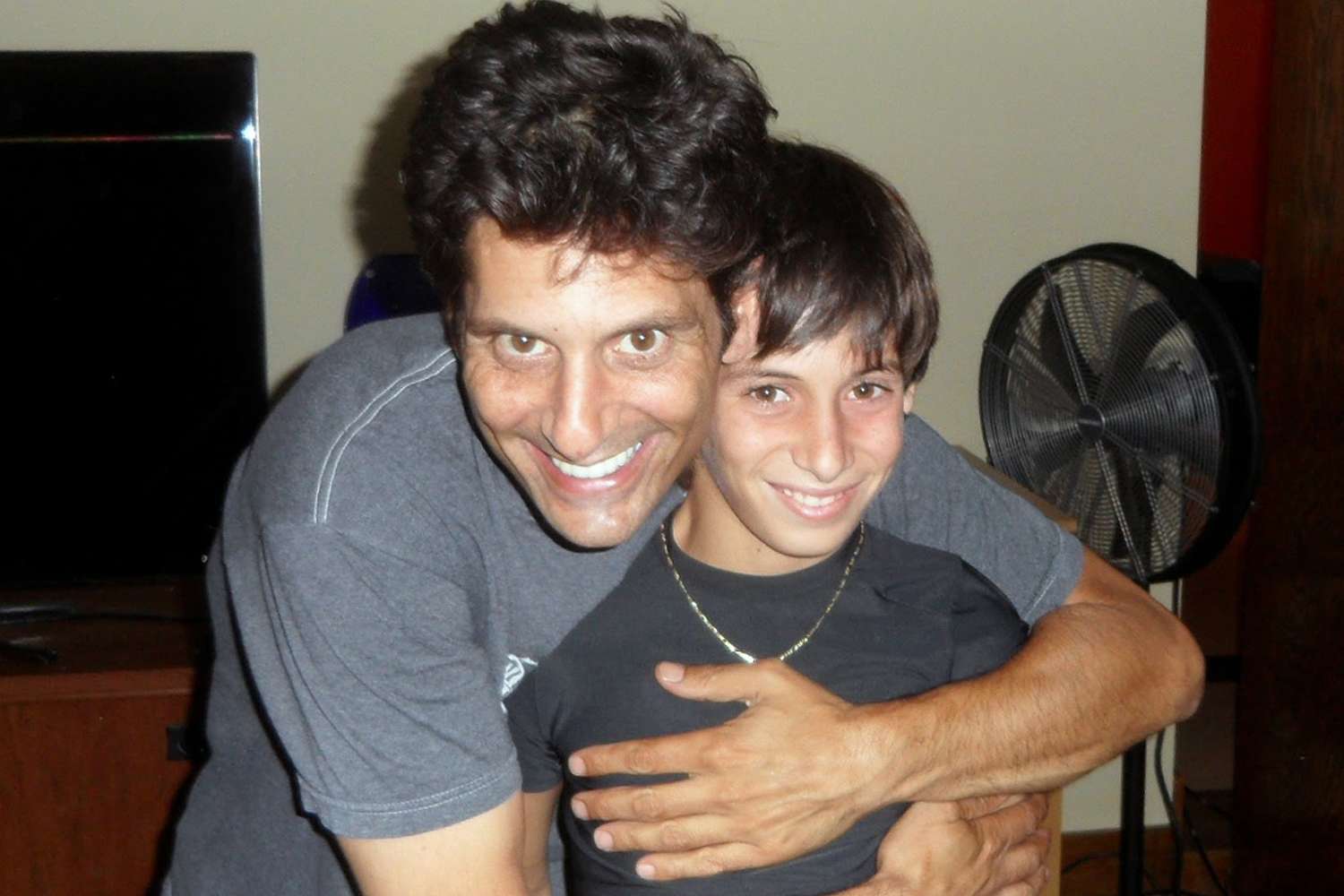NEED TO KNOW
- Phil Cohen honored his 14-year-old son, Perry, in an exclusive interview with PEOPLE, 10 years after he disappeared at sea in July 2015
- Cohen opened up about his personal experiences dealing with grief in the wake of tragedy, and shared how he’s transformed his mindset to keep Perry’s spirit alive
- Known as “The Grief Guy” online, Cohen now uses his social media platform to help others find purpose after going through profound loss
Phil Cohen has kept the spirit of his 14-year-old son, Perry, alive in the decade after his disappearance at sea.
Grieving, unexpectedly, was the transformative key to the father of one’s healing, and an unforeseen process he transparently shares online that has resonated — and helped — millions of other people find purpose after going through profound loss.
“It’s funny how your body remembers,” Cohen tells PEOPLE exclusively in the days leading up to the 10-year anniversary of his son’s disappearance. “You start to feel certain things… Even though I recognize them, you still feel them.”
“But at first, it absolutely destroyed me. Just completely,” he continues. “I had no idea what to do. The only people I’ve lost to this point were my grandparents. Didn’t really know them well, so I didn’t know grief. Then all of a sudden, I lost the most precious person in the world.”
Courtesy of Phil Cohen
Perry and his friend, 14-year-old Austin Stephanos, left the coast of Florida for a fishing trip in the Atlantic Ocean on July 24, 2015. They were last seen departing from the Jib Yacht Club and Marina in Jupiter Inlet Colony. Later that day, they were reported missing.
Then, a search that had covered nearly 50,000 square nautical miles from Jupiter to the North Carolina coast began, one that turned out to be one of the most extensive searches in U.S. Coast Guard history.
Their boat was eventually found capsized off the coast of Bermuda. The boys, however, were nowhere to be found.
Still, Cohen tells PEOPLE that he doesn’t know “exactly what happened” to Perry and Austin. Without answers, the grieving process was incomprehensible.
“When things like this happen, your brain has to make some kind of story,” he says, looking back. “I didn’t know. Did he get hit in the head when the boat flipped over and just drown right there?… Did he float until he couldn’t anymore? Did he suffer? Did he get eaten by a shark?”
Courtesy of Phil Cohen
“For a parent to have to even think about their child in any of these scenarios is ridiculous,” he adds.
Then, a sign presented itself to Cohen, a suggestion that would be unimaginably hard, but simultaneously healing in part. His oldest of two brothers, Rich, approached him two weeks after Perry’s disappearance and said, “Let’s go in the ocean.”
“‘There’s no way,'” Cohen, still emotional at the thought, remembers. “I was lying down on that couch just crying. Sorry. Even now, it’s like you put yourself right back and boom.”
Then came the sign: Perry’s voice.
“Immediately in my spirit, I just heard Perry be like, ‘Come on. Don’t be like that. Just stop,'” Cohen recalls, courageously adding, “And then, so we did.”
Cohen has since recounted that day on his social media platform, “The Grief Guy,” a reinvention of his identity online where he transparently details his own experience and emotions with the intent of helping others. The clip is his most-viewed to date.
After Cohen confronted the ocean head-on, physically submerging himself in the sea that took his son, a wave of relief came over him.
“I actually felt better going through that… This whole grief thing, you can’t outrun it,” he says, noting that “the monster gets smaller” when facing it.
While the thoughts that swirled through Cohen’s head were loud, he tells PEOPLE that he was “introduced to this world of silence” at the same time. “People are so afraid to talk about it. You feel isolated. Literally, I lost friends and family.”
“I’ve had people say to me, ‘Phil, it’s too sad for me to be around you’,” he shares.
Today, Cohen’s built a community online that’s given him — and others — a voice to express themselves openly in the wake of tragedy, a platform for those who are seeking direction amid uncharted waters after teaching himself how to do the same.
Courtesy of Phil Cohen
“It’s been a long journey,” he says. “I believe that we’re always most powerfully positioned to serve the person that we once were. Everybody was somewhere… People just want hope.”
While Cohen credits “mindfulness, resilience and faith” as a few tactics that’ve helped him continue on, he tells PEOPLE among the most comforting are the subtle reminders that keep Perry’s spirit alive to this day.
Saying his name is one of them, which Cohen breaks down in detail on his TikTok.
“If someone you love is grieving, say their person’s name,” he begins the clip, adding, “Because I can tell you with 100% confidence and conviction you saying their name won’t break them. It’s you not saying it that’s breaking them.”
So that’s just what Cohen does.
“If something comes up and I’ll mention Perry’s name, I do it for me. I don’t do it for anybody else,” he tells PEOPLE, noting, “Sometimes people get awkward, but now the people who know me and love me are cool with it. They’ll ask me about it.”
Courtesy of Phil Cohen
Sharing memories and retelling stories, too, are a few other ways Cohen connects with Perry today.
“I talk to him all the time when I see things that remind me of him,” he shares.
Baseball, in particular, brings up one of Cohen’s “fondest memories” with his son, who enjoyed the sport ever since he was young. There’s one specific moment, however, that’s not only cemented in the proud dad’s mind but also evokes a warmth that he forever feels at the thought.
“A couple of years I was coaching the team, and there was a park not too far from where I lived in Florida,” Cohen shares.
Courtesy of Phil Cohen
“Bottom of the night thinning,” he continues, setting the scene. “We were down by two runs, playing against the rival team It was like one of those games where all the parents are standing on their feet.”
“Perry gets up to the plate, and I could totally picture him digging in and standing there looking at the pitcher and smacks the home run,” Cohen remembers. “The whole place erupts. I’m standing off to the side, not behind home plate… and his whole team’s standing around home plate.”
“Like ESPN, I expect Harry to jump into this pile of high-fives and cheers — but he didn’t,” he recalls, choking up. “He ran past all of them and jumped into my arms, and I remember thinking … ‘Oh, man’.”
Still, the proud dad says, “I could feel that hug,” 10 years later.











